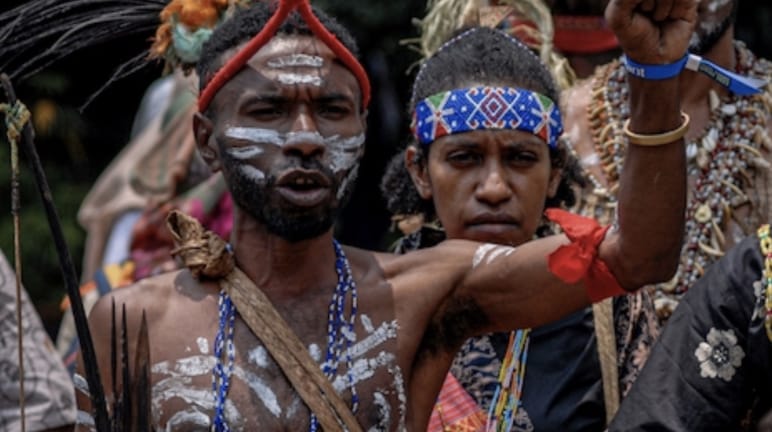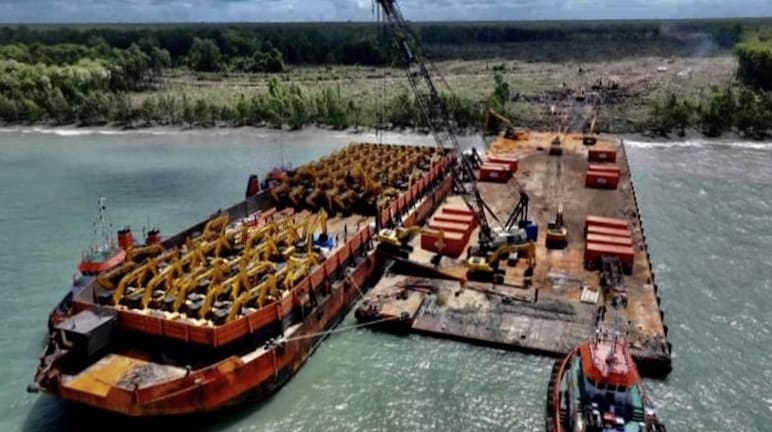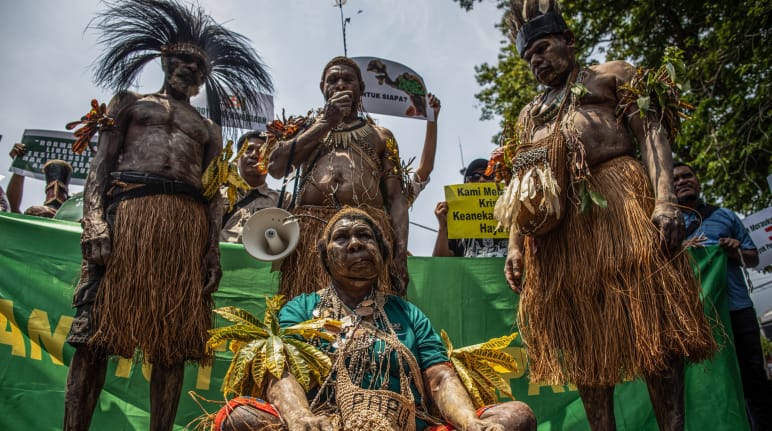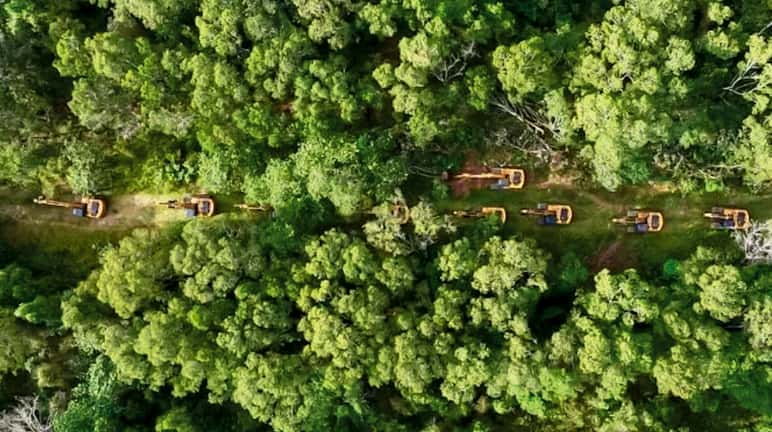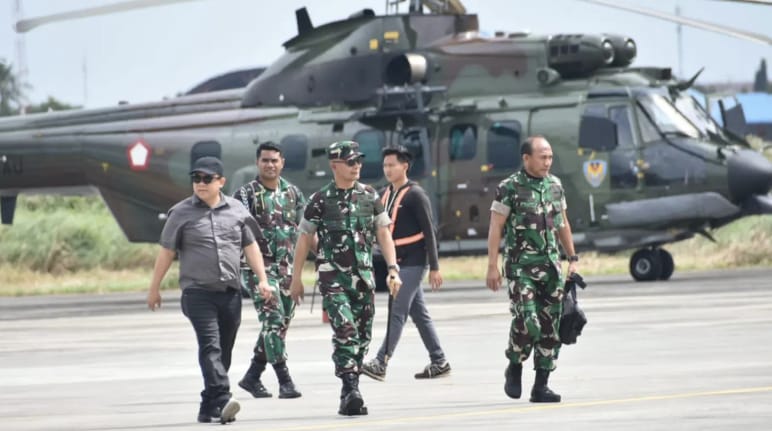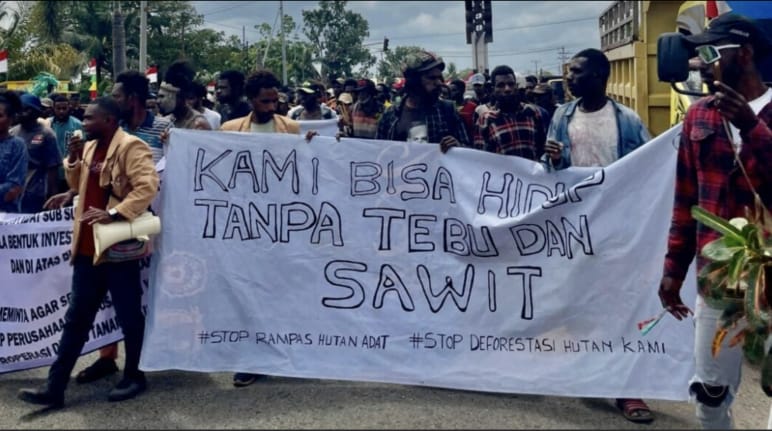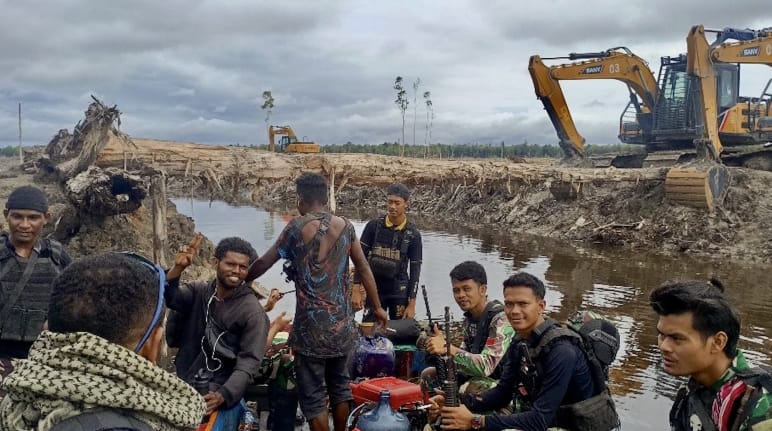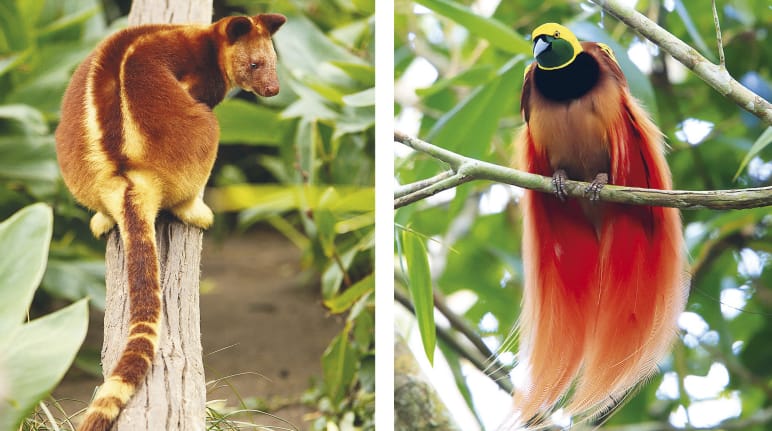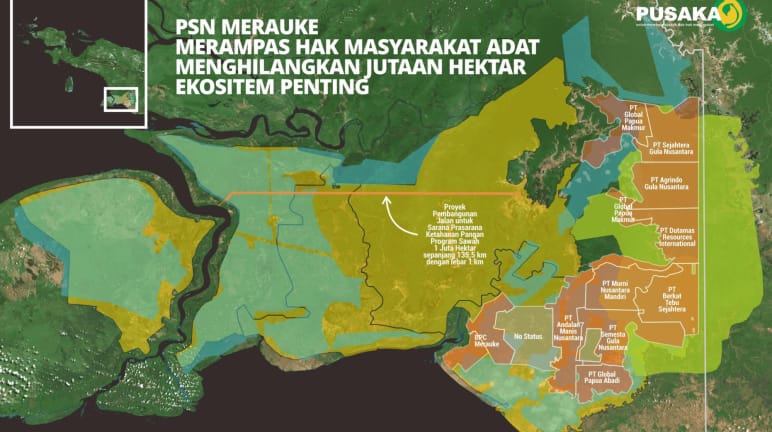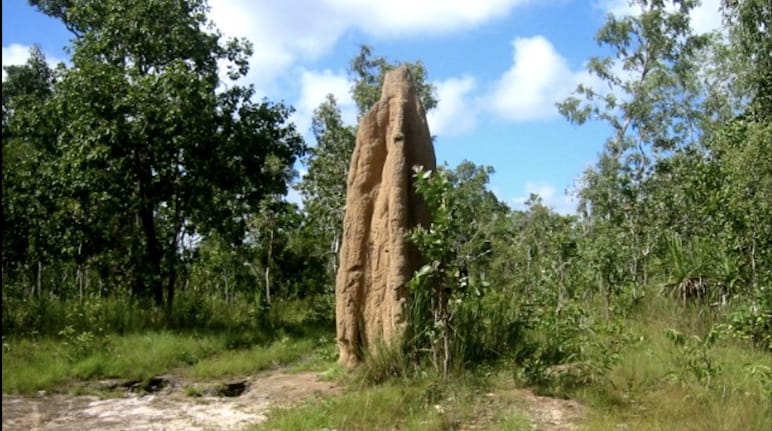Indonesia: Stop the destruction of Papua’s Marind forest!
Indonesia’s government is implementing a state-run sugar and ethanol program in southern Papua under military protection. Two million hectares of rainforest and Indigenous land are at risk – a significant threat to biodiversity and local communities.
News and updates Call to actionTo: the President of the Republic of Indonesia; Ministries of Defense, Agriculture, Investment, Environment, Forestry; UN Human Rights Council
“End the Merauke National Strategic Project, stop deforestation, and respect the rights of Indigenous Papuans.”
Since mid-2024, ships loaded with excavators have been docking in southern Papua. This equipment is destroying its primeval forests, home to tree kangaroos, birds of paradise – and 40,000 Indigenous people.
More than two million hectares of Marind and Yei forests are under threat. Mega-plantations are planned for the Merauke district, where rainforests still grow and Indigenous peoples like the Marind and Yei live.
Indonesia is implementing a “National Strategic Project” for sugar and bioethanol under the pretext of ensuring food security. In addition to plantations, five sugar and bioethanol factories, a biomass power plant, and roads are planned. Hundreds of excavators are already on-site.
A second project for one million hectares of rice is being implemented by the Ministry of Defense and the Ministry of Agriculture. The military controls the region; a new battalion has been stationed there, and soldiers are clearing the forest.
The impact of these projects? Papua, on the island of New Guinea, is home to Indonesia’s last large rainforests with their unique flora and fauna. Marsupials, cassowaries, and birds of paradise live here. The Indigenous peoples feel a deep connection to their “mother” forest. This assault on nature is a disaster of global significance – for the climate, biodiversity, and Indigenous peoples.
The Marind and Yei are defending their forest with all their might, as they have already had bitter experiences with the “Merauke Integrated Food and Energy Estate” (MIFEE). Instead of rice fields as originally planned, clear-cutting and oil palms now dominate the landscape.
“Nature is being destroyed. The birds no longer sing and the wildlife is disappearing. Please help us!”
Call on the Indonesian government to abandon its rice, sugar, and bioethanol projects and respect the rights of Indigenous peoples to their land and culture.
Read more about the background and beneficiaries in Pusaka’s background paper: The National Strategic Project (PSN) in Merauke
The Gecko Project (about the militarization of the project, with short videos; February 2025): Fear and Raiders in Papua – How thousands of Indonesian soldiers are forcing through a vast agricultural project in Indigenous lands and forests
PSN Merauke for sugar, bioethanol and rice
According to the Indonesian government’s propaganda, the goals of the National Strategic Project “Sugar and Bioethanol Merauke” (PSN Merauke) and the one-million-hectare rice project are food security, energy supply, job creation and improving the standard of living for the population. It claims that the lowlands in southern Papua are empty land and that the forest is unproductive. Yet this is the last truly large forest area in the Asia-Pacific region.
The government’s approach – geared solely toward profit – ignores the diverse ecosystems of the south, where the rainforest transitions into savannas and swamps. It is causing the destruction of rich biodiversity, much of which has never been scientifically documented. Furthermore, it completely disregards Indigenous people, their way of life in harmony with nature and their rights.
The consequences include large-scale deforestation and conversion of ecosystems into monocultures and industrial agriculture. The project is being carried out by large corporations under the supervision of, and in cooperation with, the military. All this creates new problems: land grabbing, concentration of land in the hands of a few investors, exploitation of workers, corruption, violence and human rights violations.
PSN Merauke is clear-cutting at breakneck speed
National strategic projects (PSN) have the highest economic priority. PSN Merauke for food and energy aims to increase the production of sugar and rice for the growing population and bioethanol for the energy sector or as a substitute for fossil fuels.
PSN Merauke consists of several sub-projects covering more than two million hectares:
1) 541,094.37 hectares of sugarcane plantations operated by ten companies. Permits were granted in 2023 and 2024. One of the companies, PT Global Papua Abadi (GPA), began clear-cutting in 2024. About 1,000 hectares of forest have already been destroyed – much can still be saved!
2) Large agricultural projects with modern machinery on an initial 40,000 hectares, later expanding to 100,000 hectares, in the districts of Kurik, Tanah Miring, Merauke, Semangga, Jagebob and Marind. These are worked by soldiers and students.
3) Rice plantations covering over one million hectares. According to Agriculture Minister Amran Suleiman, these are jointly managed by the Ministries of Defense and Agriculture under the slogan: “rice bowl of the world on the basis of a superpower state.” The area for the one-million-hectare rice project is located in Kuper village, Semangga District, Merauke Regency.
4) Infrastructure development including 135.5 kilometers of road in the districts of Ilwayab, Ngguti, Kaptel and Muting. The rice fields and infrastructure are financed by the Jhonlin Group, owned by Andi Syamsuddin Arsyad (alias Haji Isam). President Prabowo Subianto is also involved through his company PT Agro Industri Nasional (Agrinas). PT Agrinas has previously worked on similarly disastrous Food Estates in Borneo and Sumatra.
5) Five factories for sugar and bioethanol production built by PT Global Papua Abadi (GPA).
6) A biomass power plant with a capacity of 100 MW managed by the Ministry of Investment.
The aim is to produce 2.6 million tons of sugar, 244 million tons of bioethanol per year and rice.
Since June 2024, the J7 Explorer – a transport ship owned by the Jhonlin Group – has been transporting helicopters, cars, crew and soldiers to Merauke.
In July 2024, Liana LXXIX – a vessel from the Jhonlin Group – delivered the first batch of 2,000 heavy construction vehicles ordered from China to Merauke.
Meanwhile, hundreds of excavators are on-site destroying forests, sago palms, gardens, swamps, sacred sites and Marind Maklew forest in Wanam village in Ilwayab District under military supervision.
PSN Merauke grabs Indigenous land
The concessions overlap with the Yei Indigenous territory (316,463 hectares) and the remainder with the Marind territory. Between 40,000 and 50,000 Indigenous people live here in 40 villages.
The Indigenous people depend heavily on their land, where they hunt, grow gardens, and cultivate sago palms. They are losing their food sources, access to materials for tools, medicinal plants, and cultural and sacred sites.
They were not consulted before the permits were granted. The companies survey and claim the land. They clear the forest, drain the swamps where sago palms grow, and destroy culturally important sites. The valuable wood is transported away and sold. All this happens under military protection, which intimidates the locals.
In May 2024, the Yei sent their first letter to the government stating that they opposed the huge project, but no response has been received. Demonstrations, protests, and petitions have taken place; the media is reporting; and resistance is growing in every village.
Dorthea Wabiser of Pusaka says: “Without international support and solidarity, the government will ignore the movement. We hope that our international friends will show solidarity with us so that Papua’s forests can still be saved. Inform people about what is happening here in Papua, bring the destruction of the rainforest to the international stage, and put pressure on our government to change its decisions.
Indigenous peoples must be officially recognized and protected because they are the best guardians of the rainforest. And they preserve it not only for their own lives but for all people on earth.”
The military’s arbitrary actions are causing great unrest. “The population,” says Franky Samperante of Pusaka, “does not want to be sacrificed for ‘development’. They say:
“There is no such thing as ‘empty land’! Respect us!”
PSN Merauke destroys natural forest
According to Pusaka, future rice and sugar cane plantations would not only destroy sacred sites, sago palms, and hunting grounds but also high-biodiversity forests and forests protected under Indigenous law.
According to Pusaka’s analysis, 79 percent of the concessions held by the ten companies in the GPA Group are located in primary and peat forests, which cannot legally be cleared. The project also violates Merauke District’s spatial planning regulations, which state that 44 percent of the PSN area is designated as protected. Other areas are allocated for forest rights programs, allowing Indigenous peoples to gain official recognition as landowners with titles.
Deforestation of high-conservation-value forests will worsen the environmental crisis, reduce access to food, and lead to floods and other disasters, Pusaka predicts.
Moreover, the project contradicts Indonesia’s climate policy goals, which aim to reduce CO2 emissions by 41 percent.
PSN Merauke violates human rights
According to the law, national strategic projects must not only comply with spatial planning. Social and ecological studies, environmental documents, compliance with building regulations, and a transparent presentation of financing and corresponding permits are also required. Not to mention participation and free prior informed consent of the population.
In reality, however, the government is paving the way for massive theft of Indigenous land with the help of military intimidation.
“The government is violating human rights, land rights, the right to a healthy environment, the right to food, to culture and tradition, the right to liberty and security – all of which are guaranteed by the 1945 Constitution and international law,” says Franky Samperante of our partner organization Pusaka.
Profit over people
- the Fangiano family, owners of the First Resources Group, Fangiono Agro Plantations and the Ciliandry Anky Abadi Group;
- the family of Martua Sitorus, founder of the Wilmar Group.
The ecology of Merauke
The district is characterized by different ecosystems: typical rainforest can be found in the north of Merauke, peat and mangrove forests in the south and savannas in the east.
In the southeast of Merauke, Wasur National Park occupies about one-tenth of the district. It is highly significant as a bird migration area. The national park is notable for its massive termite mounds.
Merauke is no longer ecologically intact. Extensive concessions have been granted to palm oil, timber and pulp companies. Sand mining is altering the coasts, and poaching is decimating wildlife. The military seems to be involved in all illegal activities.
Politicians and businesspeople claim that savannas and drylands are “ecologically degraded” areas and that wetlands ensure sufficient water. The opposite is true: Merauke relies on river and rainwater due to limited freshwater sources and long dry seasons. However, the high water demands of sugarcane, oil palms and wet rice are threatening the already critical drinking water supply.
Lessons from the MIFEE project
A similar project began ten years earlier. Alarmed by the insane idea of clear-cutting the southern lowlands of Papua and building rice and oil palm plantations instead, we started the petition “Papua: ‘Surrendering our land would be suicide’.” Almost 250,000 people from all over the world joined us in demanding the scrapping of the industrial agriculture projects in Merauke and the protection of the forest and the rights of Papua’s Indigenous people.
From 2011 to 2015, the Merauke Integrated Food and Energy Estate (MIFEE) was established and inaugurated by then-President Joko Widodo. Only minimal environmental and social studies were performed. The consent of the affected communities was never obtained, and to this day, the Indigenous people have yet to experience any of the promised prosperity. The ecological consequences were foreseeable: deforestation, annual forest fires, and floods.
Our petition was delivered twice in Jakarta. Above all, it helped Indigenous people network with environmental activists. Thanks in part to this resistance, two-thirds of Merauke escaped destruction.
Today, MIFEE is considered a failure. Some investors have given up. Rice does not grow there, and the goal of food security has been missed. Many villages have lost their existence. MIFEE was a large-scale land grab with the state as an accomplice. Today, a third of Merauke is in the hands of a few corporations.
According to the Office for Spatial Planning, 1,282,833 hectares would have been suitable for growing rice and oil palm – not 4.6 million hectares as planned by the government. This area would be larger than the entire district of Merauke (4,507,100 hectares).
According to data from our partner organization Pusaka, 38 companies hold concessions covering 1,588,651 hectares as of 2024. These overlap with forest areas inhabited by the Marind people. Today, 18 companies have operating licenses for 548,194 hectares of sugarcane plantations; ten companies for 297,418 hectares of palm oil plantations; seven companies for 660,556 hectares of timber plantations for the paper industry; and three others for plantations spanning 82,483 hectares. Part of the concession area remains forested.
To: the President of the Republic of Indonesia; Ministries of Defense, Agriculture, Investment, Environment, Forestry; UN Human Rights Council
Dear Mr. President, Ladies and Gentlemen,
Indonesia’s National Strategic Projects (PNS) aim to promote economic development and ensure food and energy supplies. However, the Merauke PSN for the production of sugar and bioethanol and the new one-million-hectare Merauke rice project threaten the Indigenous population and the rainforest. These projects contradict Indonesia’s climate commitments and promises to protect primary and peat forests. More than two million hectares of land – much of it Indigenous land – would be destroyed.
We call on you to immediately stop the “Merauke National Strategic Project,” the “One Million Hectare Rice Project,” deforestation, and all related measures while respecting the rights of Indigenous people and their culture.
- Terminate the sugar and bioethanol projects and the new one-million-hectare rice project immediately
- Ensure that the Ministries of Environment and Forestry withdraw the permits granted
- Respect and protect Indigenous peoples and their rights
- Invite the UN Human Rights Council to Papua
- Prevent military and police control over the PSN Merauke economic project and stop intimidation of the population
Instead, work to preserve Papua’s vital rainforests, protect its unique biodiversity, and ensure the protection of Indigenous peoples and their culture. Develop a fair and ecological economy together with Indigenous communities.
Yours faithfully,
This petition is also available in the following languages:
Help us reach 100,000:











